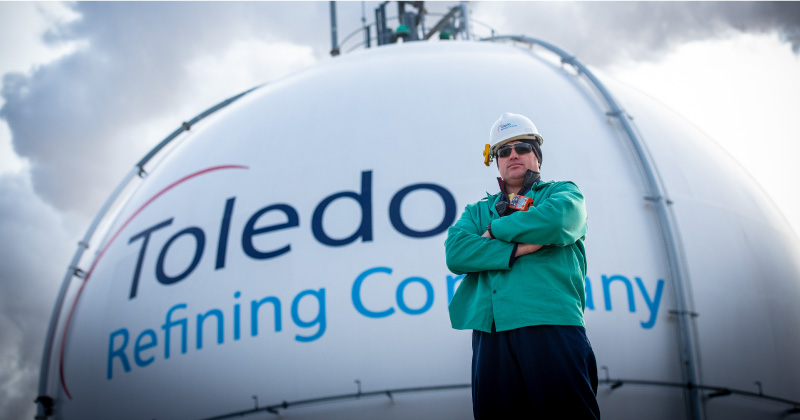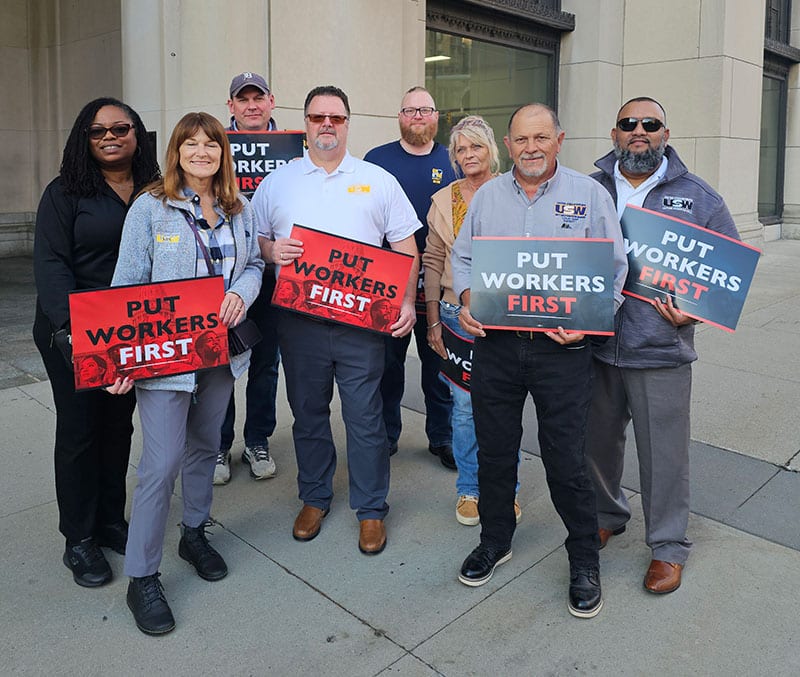A Future on the Line: Pipeline Issue Equals Uncertainty for Ohio Refinery Workers

When he was just a little kid, Mike Sarns Jr. recalls, his grandfather worked at the oil refinery about a mile from the Maumee River in East Toledo, Ohio.
As the younger Sarns was growing up, his father started working there. Today, Sarns himself is beginning his fourth decade in the facility, which, at 125 years, is one of the oldest refineries in the United States.
“It’s not just a job,” he said. “It’s home, man.”
That’s a sentiment shared by many of the 300-plus members of Local 912 who work at the Toledo Refining Co. facility.
“Our refinery needs to be a vital part of the future,” said Local 912 President Justin Donley, who has worked at the facility for 17 years.
Sadly, that future is murky today due to the uncertain status of Enbridge Line 5, a set of pipes that carry crude oil, natural gas liquids and other petroleum products through the Great Lakes states and parts of Canada. In 2019, Michigan filed a lawsuit seeking to shut down parts of the line that pass under the Straits of Mackinac, waterways that connect Lake Huron and Lake Michigan between the state’s upper and lower peninsulas.
Enbridge, the Canadian energy company that maintains the line, wants to relocate some parts of the pipe into a tunnel deep below those waterways mitigating any possible environmental threat to the Straits. But last fall, Michigan Gov. Gretchen Whitmer revoked a 1953 easement, which could prevent the line from continuing to operate, putting the tunnel project in jeopardy and imperiling the financial viability of the Toledo plant.
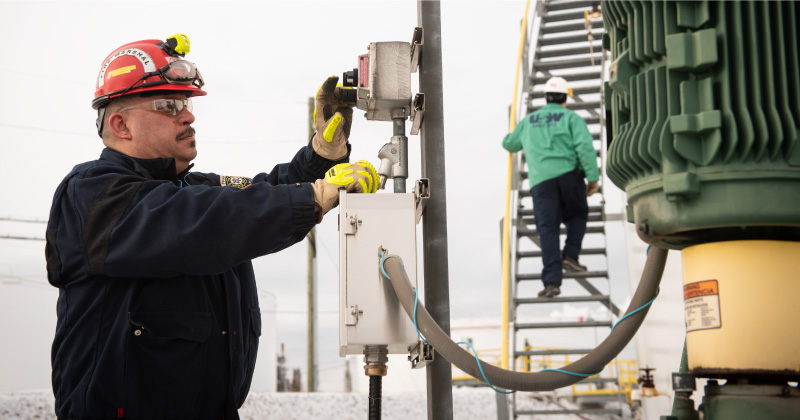
A Cleaner Refinery
Whitmer’s opposition to the Line 5 project stems from environmental concerns, but USW members say that those fears are misplaced and note that their facility is one of the most environmentally friendly oil refineries in the world.
Donley, who has led Local 912 since 2016, said that Line 5 supplies the Toledo facility with a type of light, sweet crude oil that allows workers there to produce cleaner products than most other sites.
“Our whole process ends a lot cleaner,” Donley said. “If you’re focusing on the carbon footprint, we set higher standards for ourselves, and it all comes from what we get through Line 5.”
District 1 Director Donnie Blatt said USW members have met with lawmakers and environmental groups in Ohio, Michigan and Washington, D.C., since the summer of 2019, including representatives of Whitmer’s office, to address the Line 5 issue.
“We are committed to advocating for a safe, clean environment,” Blatt said. “But we believe that does not have to come at the cost of good-paying, family- and community-sustaining jobs.”
Blatt said that the tunnel project would alleviate environmental concerns related to the Straits and would ultimately benefit residents of Michigan and Ohio.
“We just need the time and the cooperation from all involved to get it done,” Blatt said.
Childhood Memories
Donley, a native of the Toledo area whose father, Tod, has worked at the refinery for 30 years, said he remembers visiting the plant on “Take Your Child to Work Day” as a sixth-grader. It was a dirty, smelly enterprise in those days, but by the time he started working there a decade later, that was no longer true.
“I said I’d never work in a place like that,” Donley said. “Just in that time, the place had completely changed. If we lose Line 5, even if we continue operating, we’re not going to have that same clean starting product.”
That’s one reason why USW members have mobilized, to make sure that Line 5 can continue to operate safely and cleanly and that the refinery can continue to serve as an economic engine for the families and businesses of northwest Ohio.
Donley cited statistics that show that each of the good, family-supporting jobs at the refinery in turn supports 12 to 15 more good jobs in the broader community. Including management, there are about 500 regular employees along with – at times – hundreds more contractors who work at the site.
“Even on the low side of that, you’re talking at least 6,000 jobs in the surrounding community that could be lost,” he said. “The economic impact could be horrible.”
For Tira Houston, a single mother and Toledo native in her 18th year at the facility, shutting down the refinery would mean the loss of the job that has allowed her to provide for her 13-year-old while also giving back regularly to those in her community who need support.
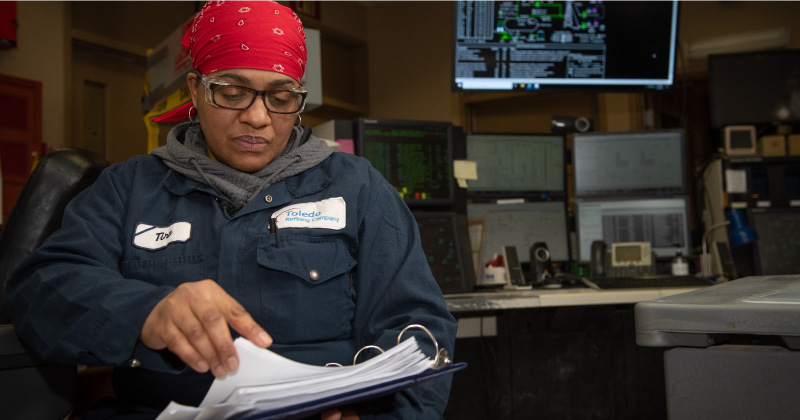
Houston, an active Woman of Steel, has consistently worked to support those in need in the Toledo area through holiday donation and school supply drives, volunteering for after-school programs, and other philanthropic efforts.
“We have always helped the community in our area,” said Houston, one of the few Women of Steel at the Toledo refinery. “These jobs are important.”
Economic Ripple Effect
Houston, whose labor lineage stretches back to mother’s and grandfather’s service as union stewards, said the prospect of losing Line 5 “is very troubling” because it could result not only in lost jobs for Local 912 members, but shuttered restaurants, gas stations, hotels, grocery stores and other businesses in the area around the refinery.
“We’re all in this together,” said 25-year refinery worker and Local 912 member John Avery. “This is where we live, and we all have to take care of it.”
Taking care of their community means working to preserve the use of Line 5 so that the oil – as Sarns, Donley and others say – “stays in the pipe.”
The alternative, they said, could mean thousands of tankers carrying petroleum products back and forth along local highways and railways, as well as higher fuel prices throughout the region, from the jet fuel used by carriers at Detroit Metropolitan Airport to the heating oil that is vital for residents of Michigan’s Upper Peninsula.
Looking at the big picture, the result would be more widespread economic consequences, as well as additional environmental problems from increased emissions, leaks and other potential disasters, Local 912 members say.
“It’s just not feasible,” Donley said. “When the stuff gets out of the pipe, that’s when it gets dangerous.”
Donley called himself an “avid outdoorsman” and said that he and other members of the local in Toledo consider themselves to be environmentalists. They are proud to work in a facility that they view as an essential part of the transition to a greener economy, he said.
“We need to use the resources we have,” said Avery. “But we need to use them wisely.”
Without Line 5, he said, “we would become a worse polluter, which nobody wants to be, especially moving forward. We are proud to be a clean, safe refinery.”
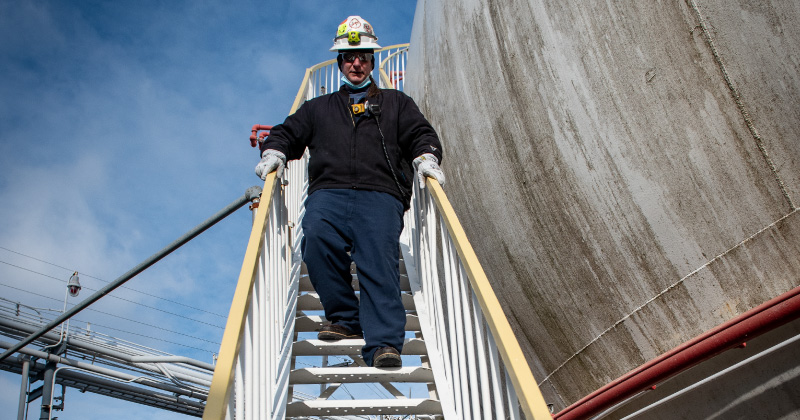
Worker Health and Safety
In addition to fighting for a cleaner, safer environment outside the refinery, the members of Local 912 have a deep commitment to safety inside their workplace.
Donley acknowledged the inherent dangers in any refinery and said that if “things go wrong,” the potential for serious injuries is high. But, he said, the USW’s commitment to safety on the local, district and international levels gives him peace of mind that workers will return safely home each day.
Donley pointed out that the USW international has fought for process safety management standards and other industry-specific processes designed to keep workers as safe as possible. In Toledo, he said, plant management works closely with the local to ensure worker safety and environmental protection.
“You don’t want anybody getting hurt no matter where they work,” Donley said. “I don’t think we would be anywhere close to where we are now if we didn’t have the union.”
Experienced Work Force
Besides its steadfast support for worker safety, the USW has helped to secure strong wages and benefits for the Toledo workers, which has helped to build an experienced work force with a sense of dedication to their work and to each other.
Avery has worked at the Toledo refinery since 1995 and said that one thing that sets the facility apart from other industries is that there is always work to be done – 24 hours a day, 365 days a year.
“There’s no on/off switch,” Avery said. “There are always people there. It doesn’t matter if it’s Christmas, Thanksgiving, we are there.”
Sarns recalled his family celebrating the holiday on Christmas Eve so that his father could work a shift at the refinery the next day.
“That’s the refinery,” he said. “It’s that kind of a job.”
It’s also the kind of job that gives workers the chance not just to make a living but to build a life. Avery was able to serve 22 years in the Air National Guard, including two tours of duty overseas, always knowing that he would have a job when he returned.
Sarns said that he started working at the refinery out of high school and, thanks to a tuition-reimbursement program, was able to earn a civil engineering degree.
“Everybody thinks ‘it’s just a refinery,’ but there are so many opportunities there,” Sarns said, noting that he is one of many workers who have a long family history at the facility.
Sarns has known Donley, the local union president, since they were kids. Donley’s father, Tod, still works there, too, and said that getting his job at the refinery after working other jobs made him “feel like I hit the jackpot.”
“Things were tough, and things really turned around once I got into the refinery,” Tod Donley said. “It opened a lot of doors, not just for me, but for my entire family.”
Those family and community connections are part of the reason that Local 912 members are fighting so hard to preserve the refinery’s future in the face of the uncertainty surrounding Line 5.
Justin Donley said that even as the global economy slowly but surely shifts away from fossil fuels, he knows there will still be a need for clean, safe and efficient oil refineries like the one in Toledo for a long time.
“Even as things do start to shift,” Donley said. “I think our refinery will be one of the last ones to go.”
Click here to download a printable version of this story.
By clicking Sign Up you're confirming that you agree with our Terms and Conditions.
Recent News Articles
Want to Learn More?
See how the USW is making a real difference in our communities and our workplaces.
